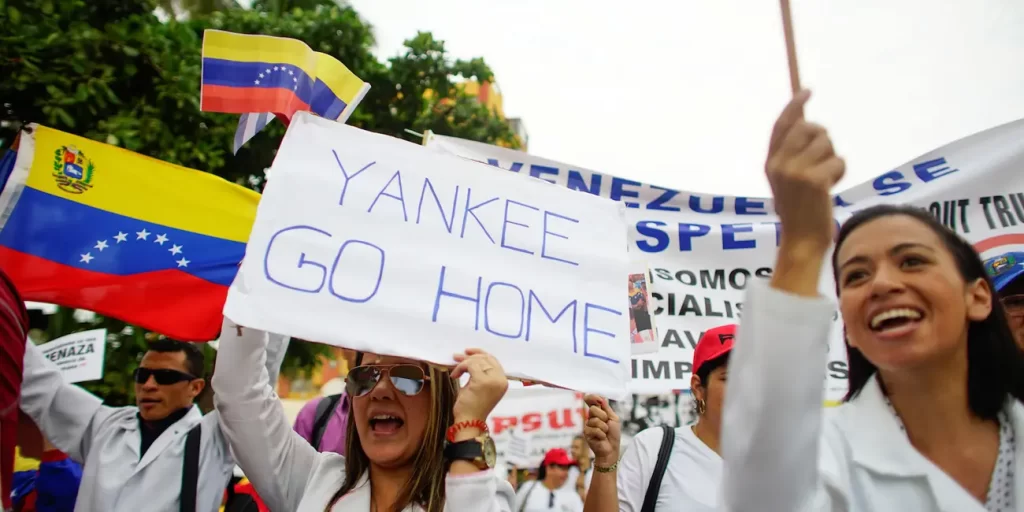By Tim Young, Venezuela Solidarity Campaign.
With elections for Venezuela’s state governors, mayors and regional and local councillors less than eight weeks away, talks held in Mexico between the Government of Nicolas Maduro and sections of the US-backed right-wing opposition appear to be yielding positive results so far.
The current round of talks, which are being mediated by Mexico, Norway, the Netherlands and Russia, began in August and concluded with a memorandum of understanding that committed the participants to respecting Venezuela’s Constitution, the rule of law and human rights. Critically, it called for sanctions to be lifted and for violent coup attempts to end, while backing “inclusive democracy and a culture of tolerance” and “elections with guarantees.”
The second session in early September led to more progress, with the IMF agreeing to transfer US $5.1 billion to the country’s international reserves. Following the third session in late September the Norwegian mediators published a joint statement which committed both parties to “establish consultations with diverse international and national political and social actors to set up … an efficient mechanism for participation.”
Although no date has been set for the next round, it is expected to focus on “returning institutional order” to the country, especially in judicial areas and the rule of law.
Caution about the final outcome is required, though, given that talks held in 2019 were scuppered by the US imposing new wide-reaching sanctions. Earlier attempts at dialogue in 2017-8 in the Dominican Republic also failed, when opposition leaders walked away after then-Secretary of State Rex Tillerson phoned lead negotiator Julio Borges.
And in late September, a social media broadcast by the US’s unofficial ambassador to Venezuela, James Story, has threatened to disrupt the progress made in the negotiations.
If the memorandum and other commitments are followed through, this could spell the end of the economic and political instability that has dogged the country since Hugo Chávez was first elected in 1998. Since Maduro won the presidency, US sanctions and other interventions have ratcheted up the pressure.
Following these talks, right-wing opposition parties announced their participation in the regional and local elections taking place on 21 November. This will be the first time these US-backed opposition groups have participated in elections since 2017, although other, more moderate, opposition parties have taken part since then.
In 2019 several minority opposition parties opposed to sanctions and violent coup attempts detached themselves from self-proclaimed “interim president” Juan Guaidó and formed the Democratic Alliance to contest the December 2020 parliamentary elections. Although joined by traditional opposition forces such as COPEI and Democratic Action, they won only 20 out of the 277 seats in the National Assembly.
Their engagement with the government has been worthwhile for them though, producing electoral guarantees for the 2020 elections and a new makeup of the five-person National Electoral Council, which now has two opposition members.
But the crucial factor affecting the success or otherwise of the talks will be how the United States and its junior partner the European Union will respond to them. The US and the EU issued a joint statement in August that called for free and fair local, parliamentary and presidential elections but only committed to a review of sanctions “if the regime makes meaningful progress in the announced talks.”
In response, Venezuela’s then-Foreign Minister Jorge Arreaza pointed out that “sanctions are illegal and generate suffering…. They should be eliminated due to their illegality and perversion.” Whether the sanctions will be lifted or significantly eased is critical for Venezuela’s future.
To date, the Biden administration has shown little sign of how it might relax or overturn its sanctions policy. In March, Biden formally renewed the declaration of a state of national emergency which brands Venezuela “an unusual and extraordinary threat to the national security and foreign policy of the United States. First introduced by the Obama administration in 2015, the Trump administration used the declaration to intensify the sanctions programme into a blockade akin to that imposed against Cuba.
Biden’s action completely ignored the February 2021 preliminary report of Alena Douhan, Special Rapporteur on human rights for the United Nations (UN). She concluded that Washington’s unilateral coercive measures and its raft of blockade actions (economic, financial, commercial, political and diplomatic), had completely debilitated the Venezuelan economy and massively degraded the quality of life of ordinary Venezuelans.
More recently, in mid-August a group of UN experts declared that the sanctions on Venezuela impinge on the country’s right to development, adding that they constitute a “punishment of civilians.”
As well as this international pressure, Congressional members are also agitating on the issue. In a recent letter to Secretary of State Antony Blinken, seventeen representatives called on him to “alleviate the suffering of the Venezuelan people by taking immediate steps to lift the broad and indiscriminate sanctions.”
While the Venezuelan government negotiate with sections of the opposition, we must step up our expressions of international solidarity with Venezuela in defence of its national sovereignty, making it clear that the illegal sanctions imposed on the country must be lifted.
- Sign the Venezuela Solidarity Campaign petition against the US’s illegal sanctions on Venezuela at bit.ly/stopvenezuelasanctions
- Join the Latin America 2021 Conference with Jeremy Corbyn and guests from across Latin America on Saturday December 4 in central London. Details and tickets at http://latinamericaconference.co.uk/

